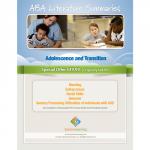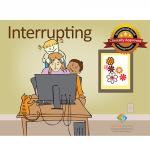Blog Categories
- ADHD
- Applied Behavior Analysis
- Autism Awareness
- Autism Service Providers
- Case Studies
- Dignosis
- Classroom Management
- Credentials
- Ethics
- Family Matters
- FAQs About LIVE Events
- Financial Planning
- Holiday Planning
- IEP's
- Panelists
- Private Equity in Autism & ABA Industry
- Psychopharmacology
- Sensory Processing Disorder
- Speech and Communication
- Subject Matter Experts
- Summer Planning
- Transition Planning
Puberty: What’s Going on with My Body?
While attending UD she worked as an ABA therapist on a home team. She then went on to earn her Master’s Degree in Social Work from Case Western Reserve University with a focus in Children, Youth, and Families.
Throughout her academic and professional career she has focused in the areas of adoption, domestic violence, teen crisis intervention, and autism. She joined Step By Step Academy in January 2010 and is excited about being able to combine her interests of Social Work and autism. She is currently working on various projects about autism and puberty, in which she hopes to make parents more comfortable about addressing these needs with their children. Additionally she is working with various consumers doing individual and group counseling sessions with focus on gaining social skills and being able to identify and appropriately manage feelings and emotions.
Puberty: What’s Going on with My Body?
In order to be able to talk to your child about puberty and make a plan that works best for your family, it is important that everyone in the child’s life understands what puberty is. While puberty is a series of changes that happen over the course of several years, each individual that does through puberty reacts differently. Once you have the information about the process, you can decide what is the best way to go about preparing your child and family for these changes.
Everyone
Both boys and girls experience several of the same things during the time of puberty. These changes usually begin to happen as early as age 10 for both sexes and will continue on average over the next three to four years. Some changes that parents will notice whether they have a daughter or a son are growth spurts, increase in hair all over the body, and higher likeliness of body odor and acne. Additionally, there will be changes in body shape, changes in voice, and they may begin to identify being more sexual.
Boy Specific
Males have gender-specific changes that you will begin to notice as they begin the process of puberty. The biggest change that happens with boys during this time is the change in their sexual organs. Males will begin to see changes in their penis and testicle size, as well as an increase in hormones. This will lead to males getting erections more often, including spontaneous erections. Another change that will happen is that the body will begin to produce semen, which will in turn result in boys having their first ejaculations, whether it be through masturbating or during a wet dream. Because of all of the changes with reproductive organs and the spontaneity of the occurrences, it is important to talk to boys about what will happen with their bodies, as well as preparing them for these occurrences and how to appropriately handle them.
Girl Specific
Girls, too, have gender-specific changes that will begin at the onset of puberty. Physically, they will begin to develop breasts which can be a painful and lengthy process, including swelling and soreness. In terms of reproductive changes, the biggest is the onset of menstruation. Girls begin this process typically between the ages of 10-16. Changes that occur during this time can include cramping, vaginal discharge, and general uncomfortableness. Because of the changes that happen are often disturbing, it is good to prepare females for these changes as early as possible. Many people with autism do well with visual aids and charts, so beginning a schedule to let a female know when she can expect her period as well has steps about how to take care of her body during this time work well. Additionally, parents and caregivers can use social stories about menstruation, changes in the body, and feminine hygiene to explain the process to females.
RECOMMENDED PRODUCTS
Adolescence and Transition Bundle
Interrupting Social Story Curriculum








